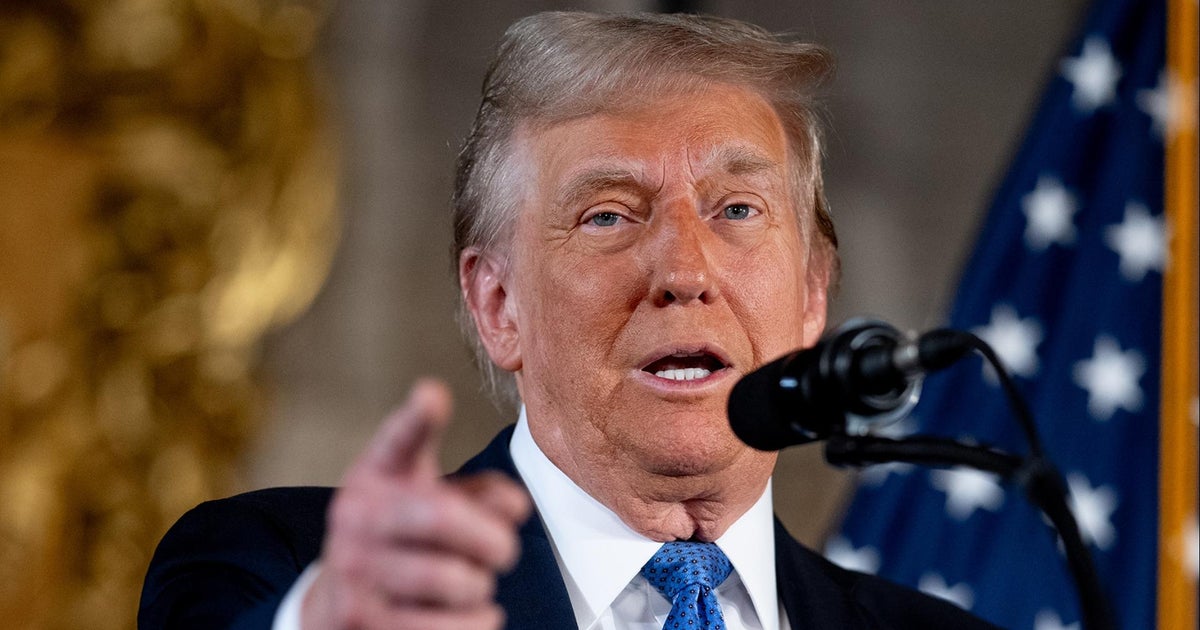Trump and Harris' views on China, according to their records and what they've said
Washington — Vice President Kamala Harris and former President Donald Trump have accused one another of being weak on China, which is widely viewed as the greatest geopolitical threat and economic rival to the U.S.
The Trump campaign has suggested, without citing any evidence, that Harris' running mate, Minnesota Gov. Tim Walz, could be working for the Chinese. Walz has a long history with the country, dating back to 1989 when he taught English at a Chinese high school. However, he has spent his political career criticizing the Chinese government, especially its human rights record.
"We all know that Kamala Harris wanted to outsource our factories and jobs to China, but I didn't expect her to outsource the selection of her running mate to China, too," Trump's vice presidential pick, Sen. JD Vance of Ohio, said during a campaign stop in Asheboro, North Carolina, in August.
In September, during their presidential debate, Harris argued that Trump "sold us out" to China by "selling American chips to China to help them improve and modernize their military," and she noted her rival's praise for Chinese President Xi Jinping. During the Biden administration, the U.S. implemented export controls to help try to keep American technology out of China. Restrictions on advanced semiconductors and chip-manufacturing equipment were tightened a year later.
But during her campaign, Harris has offered scant details about how her China policy would differ from President Biden's. The president has portrayed China as an authoritarian rival seeking to surpass the U.S. as the leading global power.
Trump has emphasized trade relations, accusing China of taking advantage of the U.S. through its economic policies.
Here's a look at the two candidates' records and what they've said about China.
U.S.-China relations
In her Democratic National Convention speech in August, Harris said the U.S., not China, "wins the competition for the 21st century." It was a line she repeated at the debate.
She met briefly with Xi in 2022 in Bangkok amid friction between the two countries. Harris said she stressed the need to "maintain open lines of communication to responsibly manage the competition between our countries."
In an interview with "Face the Nation" in 2023, Harris attributed "tension" in the relationship to the competition between the two nations.
"But that does not mean that we are seeking conflict," she said, adding that the U.S.-China economic relationship is "not about decoupling — it is about de-risking."
"It's not about pulling out, but it is about ensuring that we are protecting American interests and that we are a leader in terms of the rules of the road, as opposed to following others' rules," Harris said.
Trump has sought to portray himself as a staunch critic of China, while also professing his admiration for its leader.
In a recent interview with Fox News host Mark Levin, Trump said he "respected" China and Xi, adding that he'd "rather have a good relationship with China." He previously called Xi a "brilliant guy" who "runs 1.4 billion people with an iron fist."
But Trump has threatened to escalate his trade war with China, floating a tariff of 60% or more on Chinese goods. He has also proposed revoking China's Most Favored Nation trade status, phasing out all imports of essential goods from China and banning China from buying U.S. farmland.
During Trump's first term in the White House, the Justice Department launched the controversial China Initiative, which sought to crack down on Chinese economic espionage.
He has vowed to ramp up efforts to stop China from spying on the U.S., saying last year that "a reformed FBI and Justice Department will be hunting down Chinese spies" and new visa and travel restrictions will "shut off Chinese access to American secrets."
Taiwan
Harris has reaffirmed U.S. support for Taiwan, a self-governing island that China views as its territory. The U.S. has a longstanding "One China" policy that does not recognize Taiwan as an independent nation, nor does it recognize Chinese sovereignty over Taiwan.
While visiting the Yokosuka Naval Base in Japan in September 2022, Harris said the U.S. opposes "any unilateral change to the status quo."
"We will continue to support Taiwan's self-defense, consistent with our longstanding policy," she said.
She also condemned China's aggression in the South China Sea, accusing it of "undermining key elements of the international rules-based order" and coercing and intimidating its neighbors.
Trump, however, told Bloomberg Businessweek in July that Taiwan should pay for U.S. protection, accusing it of stealing business from the U.S. chip industry.
Human rights abuses
In the Senate, Harris co-sponsored the Hong Kong Human Rights and Democracy Act, which put conditions on the U.S.-Hong Kong trade relationship. The bill was introduced amid a Chinese crackdown on pro-democracy protests in the former British colony.
Harris also co-sponsored the Uyghur Human Rights Policy Act. The bill authorized sanctions against those responsible for human rights abuses against Uyghur Muslims and other ethnic groups in Xinjiang.
Trump signed both into law.



